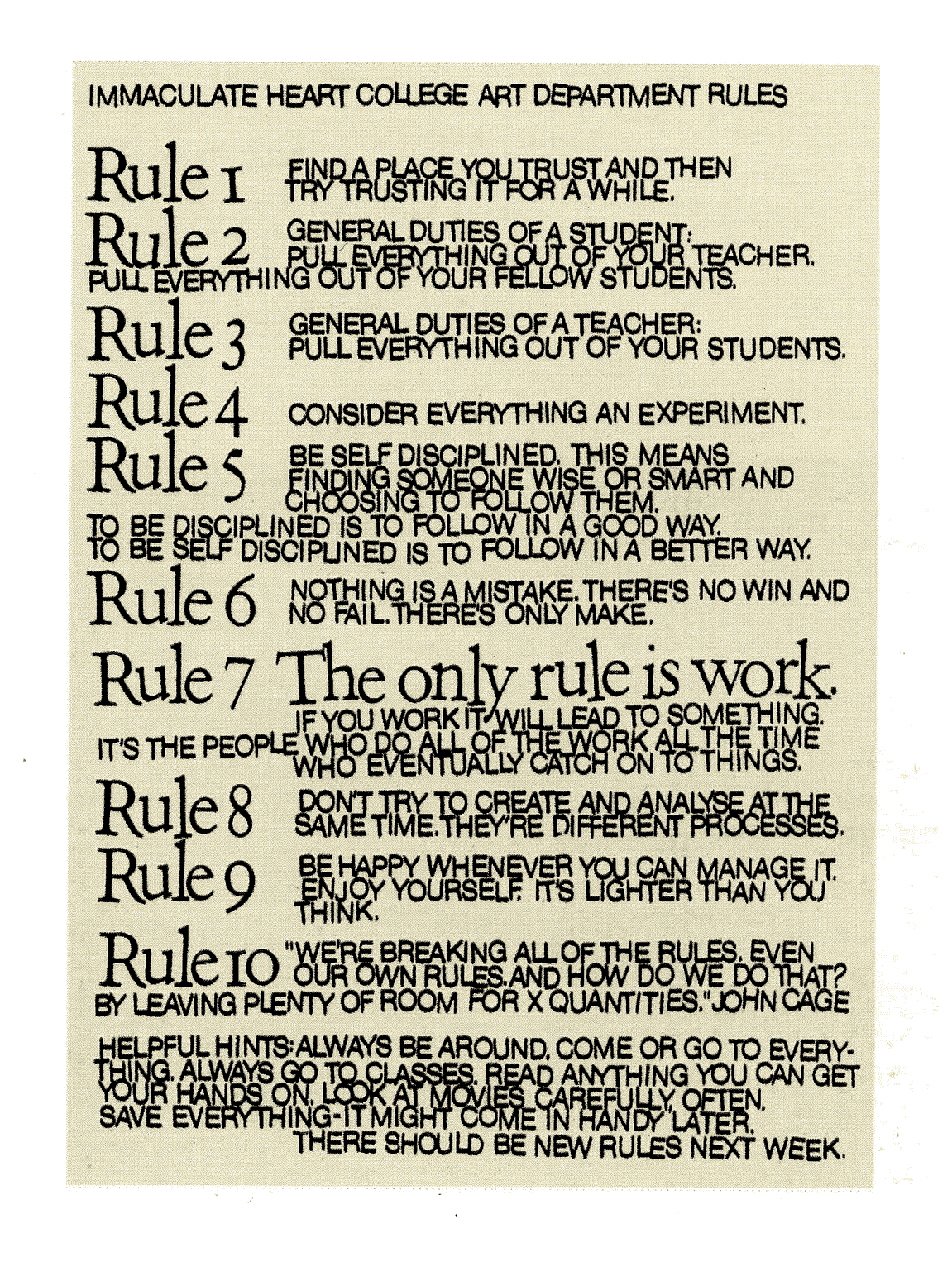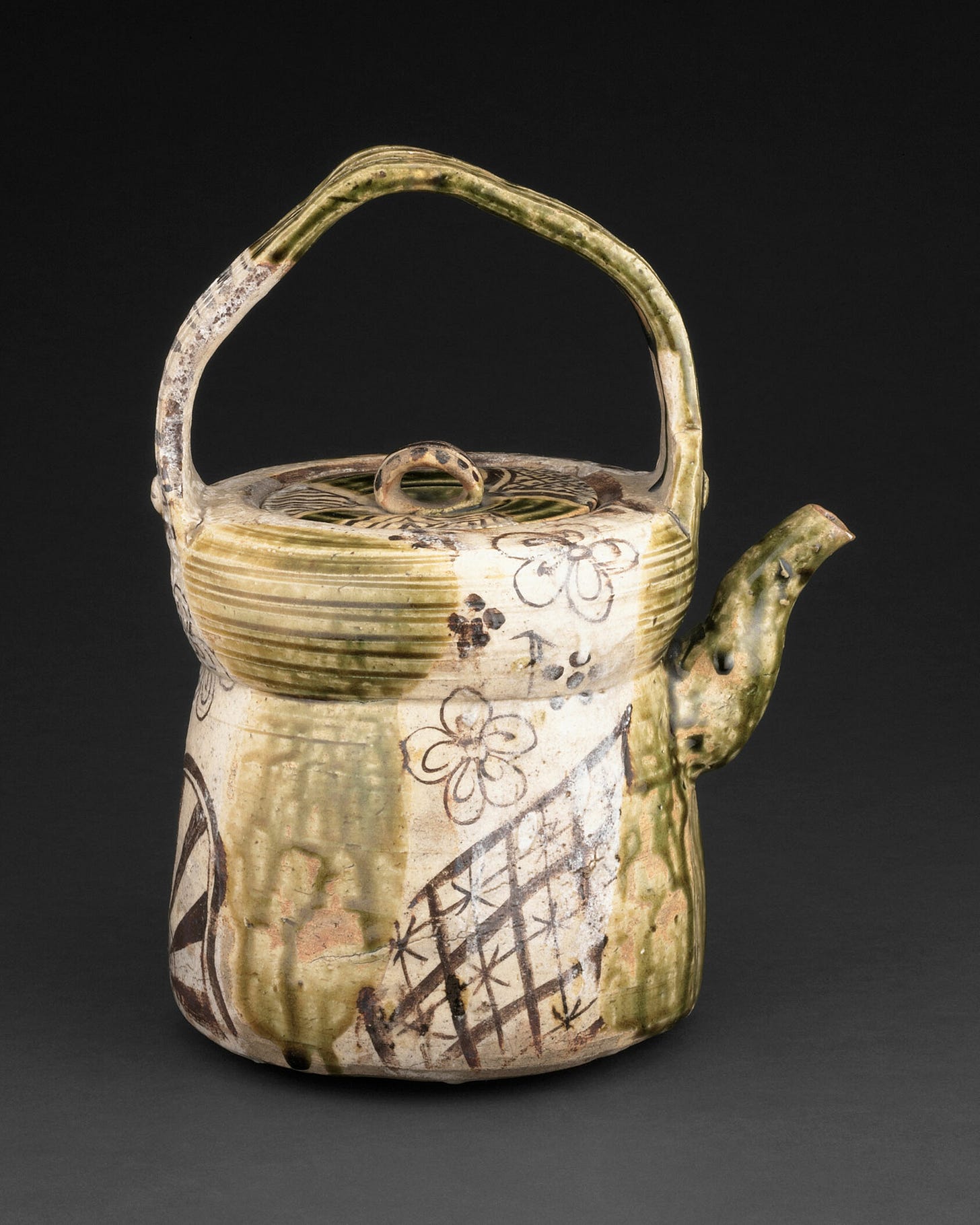Rules for students, for doing theology (and for work in general)
An invitation to put our weapons down and get to the work of love
Gentle reader,
Students come to theology classes carrying all kinds of burdens. Many of us bring similar burdens to our work, whatever that work might be.
Shame. Perfectionism. Desire to please. Fear. Feelings of inadequacy. Doubt. Cynicism. Self-consciousness. A sense of superiority or inferiority. Wounds which make it hard to trust.
As a teacher, I find that a huge part of my job is encouraging students to lay these burdens down.
Camel carrying a load of sticks. By L.A. van Es, CC BY-SA 4.0
We’re heavy laden, weighed down. We want to get it right. We may try to follow some imagined set of rigid rules that will insure our rightness. (And our righteousness?) Sometimes we need to shake up our understanding of the rules.
Consider the shake up of Sister Corita Kent’s “Rule for Artists;” even the font is shaking!
Or, recently, the artist Makoto Fujimura shared, on his Instagram, rules for artists:
I can’t hear Mako’s talk of “first love” without thinking of the book of Revelation, of the seer chastising the church in Ephesus for forsaking “the love you had at first” (Revelation 2:19). I think also of the truth that we love because God first loved us (1 John 4:19). Our work is always for the love of God. Rules exist for reasons, and if we’re going to follow rules in our work, God needs to be the reason for the rules.
I once had the privilege of a year’s work in a faculty seminar on embodied teaching, mentoring, and theater methods. (Intriguing, right? I’d love to tell you all about it, but, for now, I’ll just share one observation and one anecdote.)
Observation: if you put a group of people together in a classroom, even if (especially if?) they are experienced teachers with many accomplishments in their respective fields, they will come with a lot of the burdens named above. Add in some theater games, along with the invitation to move and to be aware of our bodies, and some of those people will be paralyzed.
Stymied.
Flush with fear.
Anecdote: one of the members of our seminar, a writer originally from Japan, told us about tiny entrances to Japanese tea houses. Imagine a door for a leprechaun: so small that humans must crawl through.
Why the tiny doors?
They require everyone to prostrate themselves in order to come in. Entrance is an act of humility, and the doors were designed to be too small to allow anyone to bring their weapons through. Swords had to be stowed outside.
Sharing this story, our colleague invited us to lay our weapons down. Being a theater guy, our seminar director then constructed an elaborate obstacle course to provide us with a tiny “door,” cobbled together with lots of string and bits of scenery. He invited us to wiggle our bodies through while meditating on our colleague’s invitation.
It transformed the seminar.
“Bear one another's burdens, and so fulfill the law of Christ” (Galatians 6:2).
Art Institute of Chicago, Oribe-Type Ewer, early 17th century, Japan
In that spirit, I offer the following rules for coming to the work of theology, which is to say, for coming to the work of life.
See that little tea house door in front of you? That portal to Narnia? That passage to Wonderland? You’re not going to fit through if you insist on carrying all that stuff. Lay your weapons down. Stow your swords. Don’t think you can get away with keeping the knife hidden in your boot. Bow your head in prayer, and crawl in all unguarded, vulnerable to being transformed. Shake it out. Breathe deep. Prepare yourself, unarmed, to have a cup of tea with unarmed friends.
Allow yourself to be served. Receive the cup that’s offered. Savor it. (I like a cup of green tea with jasmine, sweetened.) Turn and serve your neighbor, pouring a cup for them.
Picture your work space as a practice field. What happens here is not a performance, to be polished to perfection, but a place for exercise, for drills, for trying out ideas that you may or may not want to keep, for learning with a community, a tea party, a team.
Read. Seek intimacy with the scriptures. Know them more. Read things more than once. Read things written by people who are different from you. Read across time, space, culture, ethnicity, experience. Read things that are “too hard;” read above your grade level, so to speak. I promise you’ll learn things when you dare to sit at table with those well practiced in the discipline. Read things that are “too easy.” I promise you’ll learn things you couldn’t have seen, back in the day when those readings matched your supposed abilities.
Have another cup of tea. Be generous with the honey.
“My child, eat honey, for it is good,
and the drippings of the honeycomb are sweet to your taste.
Know that wisdom is such to your soul;
if you find it, you will find a future,
and your hope will not be cut off” (Proverbs 24:13-14).Write and speak and think in your own voice. Use the first person. Theology is personal work. It’s about persons, beloved of God, learning to speak and write well about the God who loves them. Theology is interpersonal work. Don’t believe claims that any theology is objective; it’s all personal and interpersonal and contextual, which is as it should be, because God loves persons and contexts.
Trust that you have things to learn from readings and classmates and colleagues. Trust that what you’re learning matters for your life, your body, your church, your ministry, your vocation, your world. Be lavish with your attention. Pay attention to others, to texts, to God, to your own body and soul.
Reading isn’t the only practice that matters here. Commune. Worship. Pray. Wonder. Adore. Love the Lord with your heart, mind, and strength. Learn with philosophers and poets and scientists. Pay attention to your gut. Use your imagination. Do not quench the Spirit.
Knowing that God is God, relax into the fact that you will not master this subject. Let the subject master you. Embrace mystery over mastery. God is the point. Love is the point. Grades and accolades are not the point.
Make a mess. Fail. Try again. Grow in grace. Repent and forgive.
Alice’s mad tea party, John Tenniel, Public domain, via Wikimedia Commons
Crawl out through that little door. Stretch and breathe. Marvel when you find that the weapons you stowed are being transformed, swords to plowshares. Take up those new tools and use them well as you seek to love the world God loves.
Claim your freedom, friends, to enter into the joy of good work. Scroll to the end of the post for a free, printable version of my “rules.”
Grace & peace,
BFJ
This piece contains associate links.
As always, I’m grateful if you’ll forward, share, and subscribe.
Why considering paying for a newsletter? Paid subscriptions let me (or other authors you believe in!) dedicate more time to doing this kind of writing. At substack, we can create an open community of conversation with no trolls, no ads, and no editors. If you’re financially able, please consider an upgrade to paid. If you’d like full paid access, but it isn’t in your budget, I’m happy to give access for free; just send me an email with your request. And if you’d like to sponsor someone’s free subscription, you can do so here:
Here is a shortened, printable version of my rules for doing theology. Feel free to share, download, and print.














Thank you! As an older woman (70’s) two years into entering a Master’s degree, this is so helpful! At the beginning of each course I have battled the many things you mentioned- the best news is that those lies have gotten fainter and fainter as I continue to engage and learn, by His grace, to see this as exploration rather than performance.
Thank-you, Dr. Jones! A copy of "Rules for Doing Theology" will be placed under the glass on my desk.